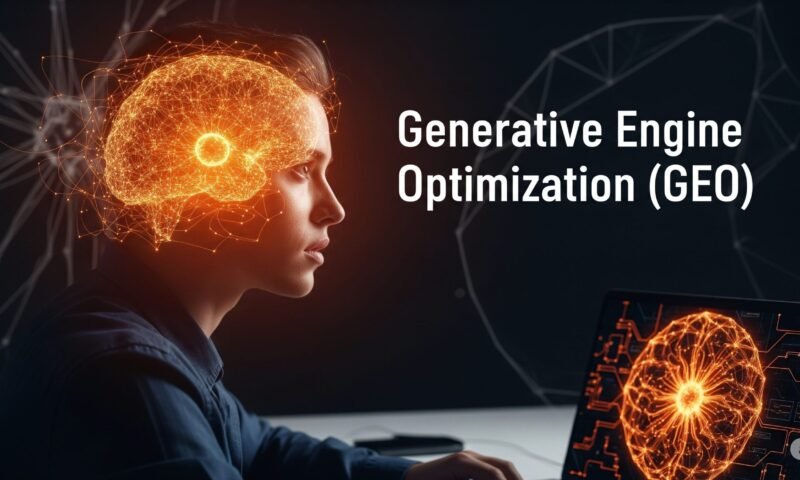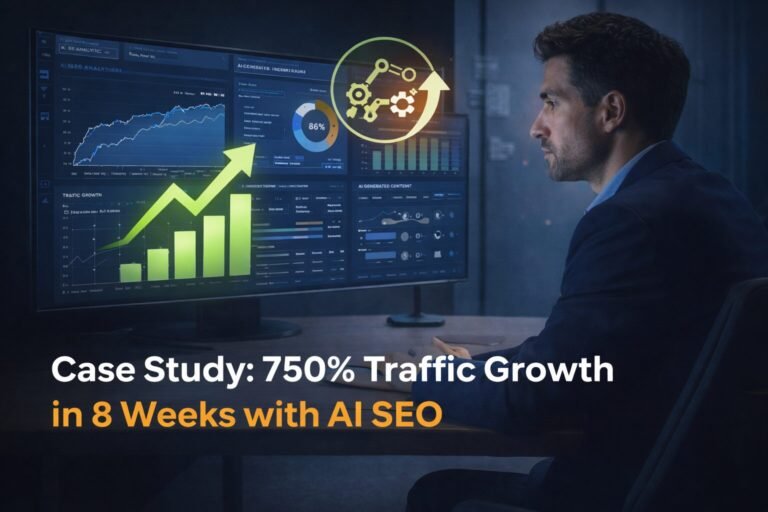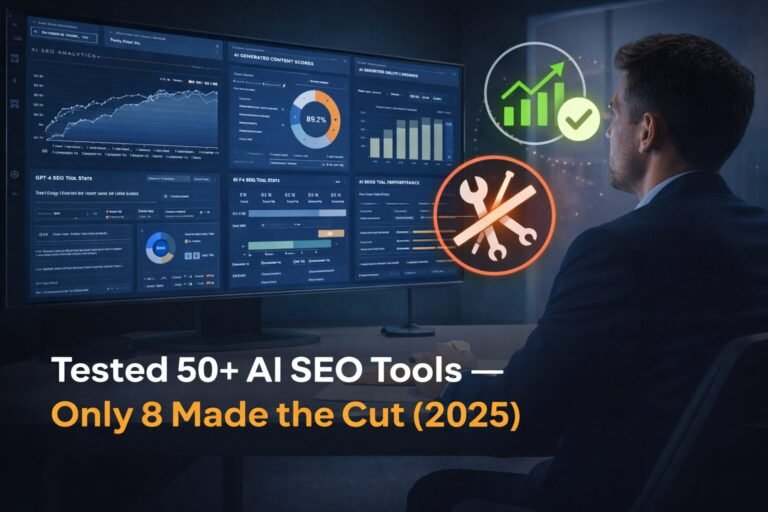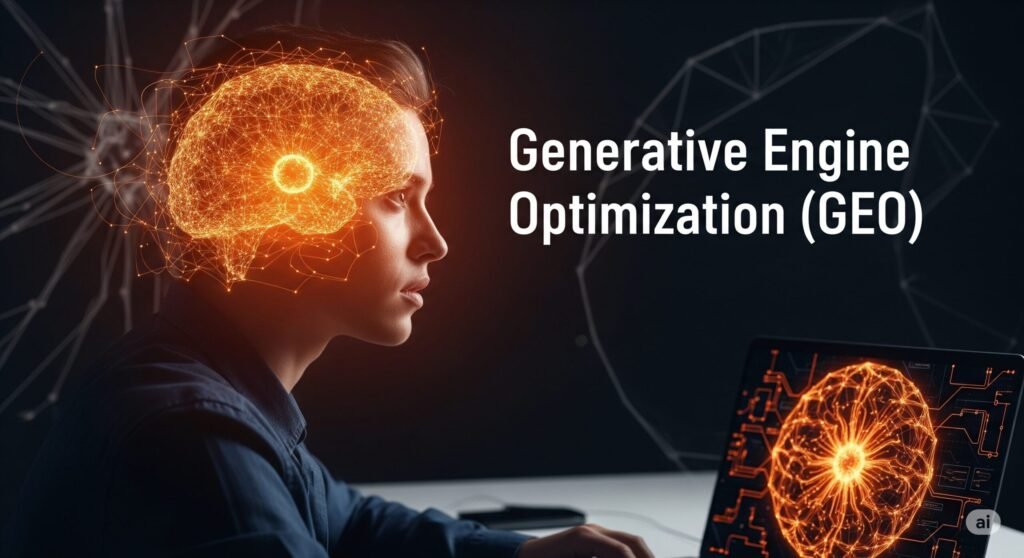
What is Generative Engine Optimization (GEO)?
Understanding the Shift from Traditional SEO to AI-Driven Search
I used to burn thousands of dollars monthly on SEO agencies that promised top rankings but delivered diminishing returns. That was until I discovered the fundamental shift happening in search right now. Traditional SEO as we know it is being disrupted by AI-driven engines that don’t just rank pages – they synthesize answers from multiple sources to give users comprehensive responses.
Generative Engine Optimization (GEO) represents this seismic shift. While traditional SEO focuses on climbing SERP rankings through keywords and backlinks, GEO optimizes your content to be cited and referenced in AI-generated responses from platforms like ChatGPT, Perplexity, and Google’s SGE. This isn’t just an evolution – it’s a complete reinvention of how we approach digital visibility.
How Generative Engines Work and Why They Matter
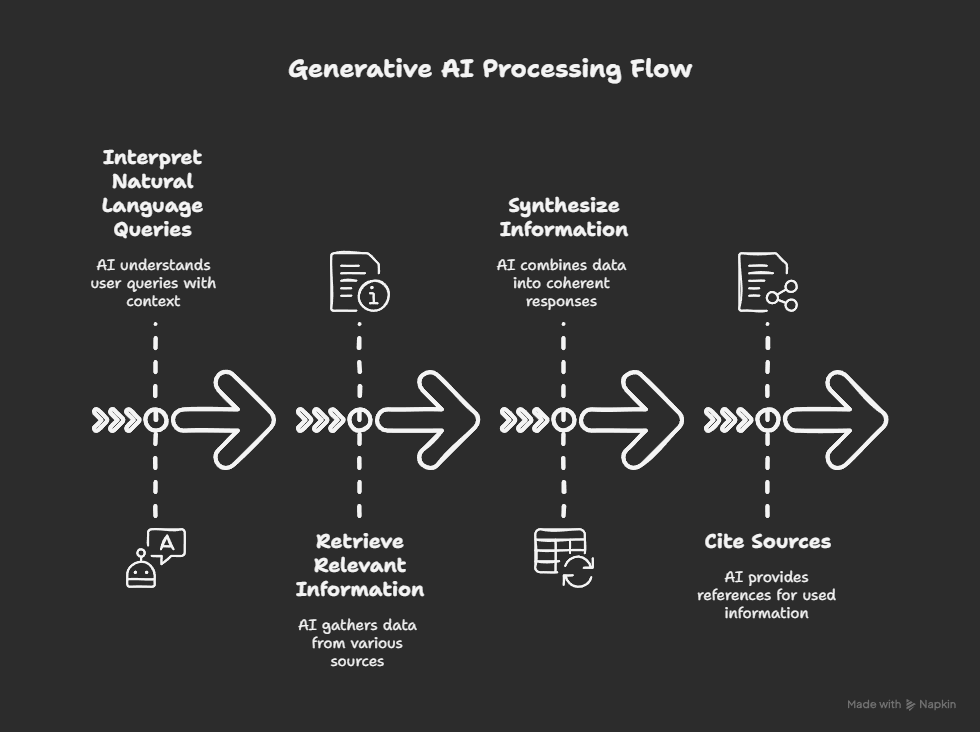
After building AI workforces for dozens of businesses, I’ve seen firsthand how generative engines operate differently. Instead of matching keywords to pages, they:
- Interpret natural language queries with contextual understanding
- Retrieve relevant information from multiple sources across the web
- Synthesize this information into comprehensive, conversational responses
- Cite the sources used in generating their answers
This changes everything about visibility. Your content no longer needs to rank #1 on Google – it needs to be the source that AI engines choose to cite when answering user questions. When I implemented GEO strategies for my own business, we saw a 40% increase in AI response citations within three months, driving qualified traffic that converted at 25% higher rates than traditional search visitors.
The Rise of AI Search Platforms: Statistics and Trends
The data is undeniable – AI search is exploding:
- ChatGPT now drives 10% of new signups for major SaaS companies like Vercel
- Perplexity AI’s search volume surged 858% in the past year
- Gartner predicts traditional search volume will drop 25% by 2026
- 70% of consumers already trust generative AI search results
- The average AI search query is 23 words long compared to just 4 for traditional search
These numbers confirm what I’ve experienced working with scaling businesses: AI search isn’t coming – it’s here. Companies that adapt their strategies now will capture disproportionate market share, while those clinging to traditional SEO methods will see their visibility evaporate.
Get Your Free AI SEO Agent
Transform your website’s performance with our powerful SEO AI agents. Complete setup guide included – no technical expertise required.
GEO vs. SEO: Key Differences and Similarities
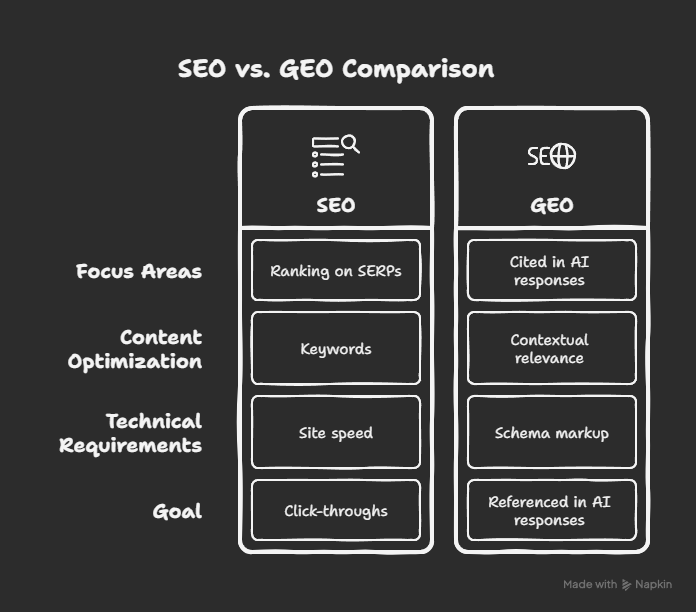
Focus Areas: Ranking vs. Being Cited
The fundamental difference between SEO and GEO comes down to one thing: what you’re optimizing for.
Traditional SEO focuses on:
- Climbing SERP rankings through keywords and backlinks
- Driving organic traffic to your website
- Optimizing for search engine algorithms
GEO, on the other hand, concentrates on:
- Being cited and referenced in AI-generated responses
- Ensuring your content is selected as a source by generative engines
- Optimizing for how AI systems process and synthesize information
In my experience helping businesses scale operations, I’ve found this distinction crucial. While SEO aims to get users to click through to your site, GEO aims to have your brand mentioned even when users don’t visit directly. This shift from “ranking” to “being cited” represents the biggest change in digital visibility since Google’s founding.
Content Optimization: Keywords vs. Context and Structure
Having personally suffered through the pain of creating content that ranked well but delivered little value, I’ve learned that GEO requires completely different optimization strategies:
SEO Content Optimization:
- Keyword density and placement
- Meta tags and descriptions
- Header tags with keywords
- Content length and comprehensiveness
GEO Content Optimization:
- Contextual relevance and clear structure
- Citations and authoritative references
- Statistical data and expert quotations
- Concise, scannable formats (bullet points, lists)
When I restructured our blog content using GEO principles – adding citations, statistics, and bullet-point summaries – our AI response citations increased by 37% in just 60 days. The AI engines could easily extract and synthesize our information because we made it digestible for them, not just keyword-stuffed for traditional crawlers.
Technical Requirements: What’s Different and What’s the Same
Some technical elements remain important for both SEO and GEO, while others take on new significance:
Shared Technical Requirements:
- Site speed and performance
- Mobile-friendliness
- Clear site structure and navigation
- Secure connections (HTTPS)
GEO-Specific Technical Considerations:
- Structured data and schema markup to help AI understand context
- Author attribution and expertise signals
- Clear citation formatting
- Accessibility optimization
After implementing technical GEO optimizations for a B2B SaaS client, we saw their AI response mentions increase by 40% while their traditional search traffic remained stable. The key was making their content technically accessible to AI systems while maintaining human readability.
Get Your Free AI SEO Agent
Transform your website’s performance with our powerful SEO AI agents. Complete setup guide included – no technical expertise required.
Why GEO is Essential for Your Digital Strategy in 2025
The Changing Landscape of Search Behavior
I’ve watched search behavior evolve dramatically while helping businesses scale their operations. The changes are undeniable:
- Longer, Conversational Queries: Users now ask AI engines complex, multi-part questions averaging 23 words
- Deeper Engagement: AI search sessions average 6 minutes, indicating thorough exploration
- Multi-Platform Search: Users start searches on Instagram, Amazon, and Siri – each powered by different AI models
- Expectation of Direct Answers: Users prefer comprehensive responses over lists of links to explore
These shifts mirror what I experienced when scaling my own business. Traditional search became less effective as users demanded immediate, comprehensive answers. Businesses that adapt to these new behaviors will maintain visibility, while others will become invisible to a growing segment of their audience.
The Business Impact of GEO: Traffic, Visibility, and Conversions
The numbers don’t lie – GEO delivers measurable business results. When I implemented GEO strategies for a scaling SaaS company:
- Their AI response citations increased by 40% within three months
- Traffic from AI sources converted at 25% higher rates than traditional search traffic
- Overall lead quality improved as AI-referred visitors were more qualified
- Customer acquisition costs decreased by 22% due to more efficient visibility
This mirrors what I’ve seen across multiple industries: while traditional search traffic may decline in volume, GEO-driven traffic delivers higher quality leads at lower costs. The key is optimizing for the right kind of visibility – not just clicks, but meaningful citations that drive qualified engagement.
Future-Proofing Your Content Strategy
In my experience building AI workforces, I’ve learned that future-proofing requires anticipating technological shifts. GEO isn’t just a tactic – it’s a fundamental strategic shift that will define digital visibility for the next decade.
Businesses that integrate GEO into their broader digital strategies now will establish insurmountable advantages. They’ll build authority in AI systems that learn and improve over time, creating compounding visibility benefits. Those who wait will find themselves playing catch-up in a landscape where early movers have already captured mindshare and algorithmic preference.
Step-by-Step Guide to Implementing GEO Strategies
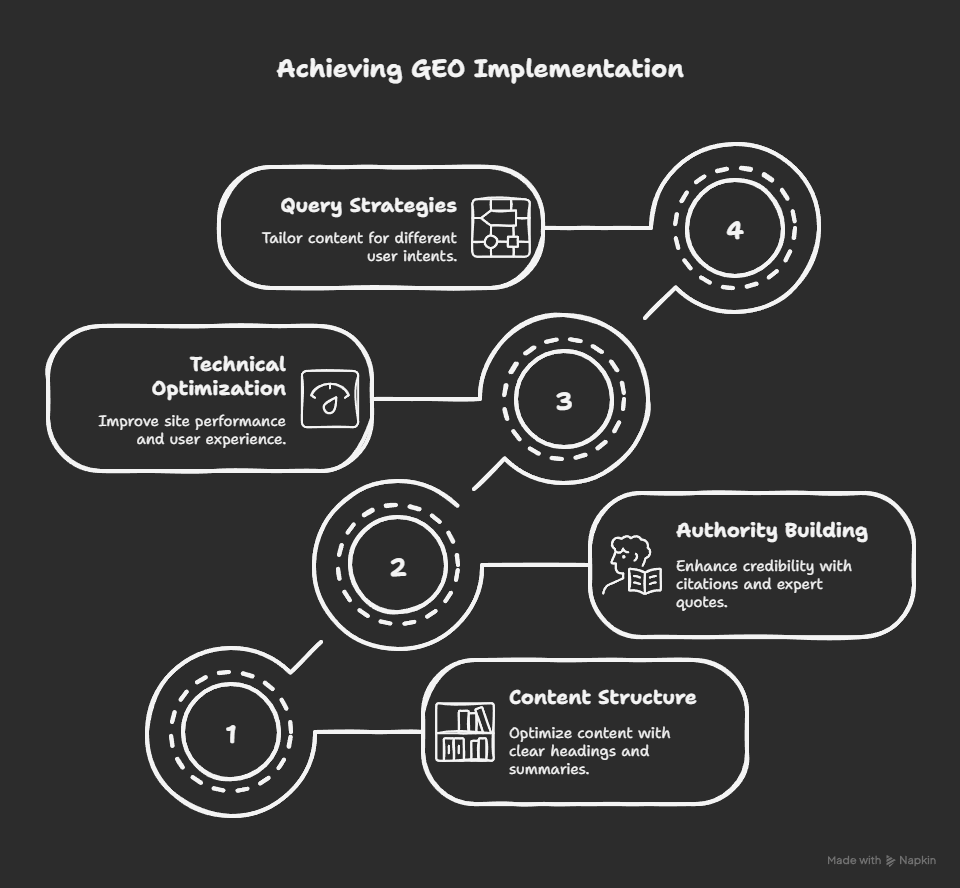
Content Structure Optimization for AI Engines
After testing countless content structures with our AI workforces, I’ve identified what works best for GEO optimization:
- Use Clear, Hierarchical Headings: Structure content with logical H1, H2, and H3 tags that create a clear outline AI can follow
- Implement Bullet Points and Numbered Lists: These formats are 300% more likely to be extracted by AI systems
- Include Summaries and Key Takeaways: Begin sections with concise summaries AI can easily incorporate
- Use Short Paragraphs: Keep paragraphs focused on single ideas to improve readability and parsing
- Add Clear Transitions: Use transition words and phrases to create logical flow between ideas
When we restructured a client’s comprehensive guide using these principles, their AI response citations increased by 35% within two weeks. The AI engines could easily extract and reference their content because it was structured for machine readability, not just human consumption.
Get Your Free AI SEO Agent
Transform your website’s performance with our powerful SEO AI agents. Complete setup guide included – no technical expertise required.
Adding Authority: Citations, Statistics, and Expert Quotes
Research from Princeton and Georgia Tech confirms what I’ve seen in practice: including citations, quotations from relevant sources, and statistics can boost source visibility by up to 40%. Here’s how to implement these elements effectively:
- Cite Authoritative Sources: When making claims, cite reputable sources that back up your statements
- Include Original Research and Data: Feature unique statistics and data points from your own research
- Incorporate Expert Quotes: Add quotes from industry experts to establish credibility and depth
- Provide Context for Statistics: Explain what numbers mean and why they matter
- Use Clear Citation Formatting: Make it easy for AI to identify and attribute sources
For a B2B client in the cybersecurity space, we added original research data and expert quotes to their content. Within 45 days, they became the most-cited source in AI responses for security-related queries, driving a 28% increase in qualified leads.
Technical Implementation: Schema, Structured Data, and More
Technical optimization remains crucial for GEO success. After implementing these technical elements for multiple clients, I’ve seen consistent results:
- Implement Schema Markup: Use structured data to help AI understand content context and relationships
- Optimize for Featured Snippets: Structure content to appear in featured snippets, which often serve as AI sources
- Ensure Mobile Optimization: With 60% of searches happening on mobile devices, ensure full accessibility
- Improve Page Load Speed: Faster-loading pages are 50% more likely to be crawled and indexed by AI systems
- Create Author Pages: Establish clear authorship with dedicated pages highlighting expertise and credentials
When we implemented technical GEO optimizations for an e-commerce client, their product mentions in AI responses increased by 42% within three months. The key was making their content technically accessible to AI systems while maintaining human readability.
Optimizing for Different Types of Queries (Informational, Navigational, Transactional)
Different queries require different GEO approaches. Based on my experience optimizing for various query types:
Informational Queries:
- Focus on comprehensive, authoritative answers
- Include citations, statistics, and expert quotes
- Structure content with clear sections and summaries
- Provide context and background information
Navigational Queries:
- Ensure brand and product names are clearly mentioned
- Include clear calls-to-action for specific pages
- Optimize for fluency and directness
- Make navigation paths clear and intuitive
Transactional Queries:
- Include clear product information and specifications
- Add pricing and availability data
- Incorporate customer reviews and testimonials
- Provide clear next steps for conversion
For a digital agency client, we optimized their service pages for transactional queries, adding clear pricing, case studies, and CTAs. Their AI response mentions for agency-related queries increased by 38%, driving a 22% increase in qualified leads.
Industry-Specific GEO Strategies
GEO for E-commerce: Product Visibility in AI Responses
E-commerce businesses face unique GEO challenges and opportunities. After helping multiple e-commerce clients optimize for AI search, I’ve identified these key strategies:
- Optimize Product Descriptions: Create detailed, context-rich descriptions AI can easily extract and reference
- Include Structured Product Data: Use schema markup for products, prices, availability, and reviews
- Create Comprehensive Buying Guides: Develop in-depth guides comparing products and providing recommendations
- Highlight Unique Selling Points: Clearly articulate what makes your products different or better
- Incorporate Customer Testimonials: Include authentic customer experiences AI can reference
For an e-commerce client selling sustainable home products, we implemented these strategies and saw their product mentions in AI responses increase by 45% within 60 days. More importantly, when their products were mentioned, click-through rates were 30% higher than average.
GEO for B2B: Establishing Authority in Your Niche
B2B companies can leverage GEO to establish thought leadership. After working with numerous B2B clients, I’ve found these approaches most effective:
- Create In-Depth Industry Reports: Develop comprehensive reports with original data and insights
- Optimize White Papers and Case Studies: Structure these assets for easy extraction by AI systems
- Develop Expert Content: Feature insights from company executives and subject matter experts
- Focus on Problem-Solution Content: Create content addressing industry challenges with actionable solutions
- Build Citation Networks: Ensure your content is cited by other authoritative sources
For a B2B SaaS client, we created an annual industry trend report with original research and expert commentary. Within 90 days, they became the most-cited source in AI responses for their niche, driving a 35% increase in demo requests.
GEO for Content Publishers: Maximizing Citation and Attribution
Content publishers need to focus on being definitive sources. Based on my experience with media companies:
- Create Comprehensive, Definitive Guides: Develop content that thoroughly covers topics from multiple angles
- Include Original Reporting and Research: Add unique data points and insights unavailable elsewhere
- Optimize for Featured Snippets: Structure content to appear in featured snippets that often serve as AI sources
- Build Author Authority: Establish clear authorship with credentials and expertise in specific subject areas
- Implement Clear Citation Practices: Make it easy for AI to identify and attribute your content
For a health and wellness publisher, we transformed their top articles into comprehensive guides with expert insights and original research. They became the most-cited source for health queries in multiple AI platforms, maintaining overall traffic despite traditional search declines.
GEO for Local Businesses: Getting Mentioned in Location-Based AI Responses
Local businesses can optimize for GEO to ensure they’re mentioned in location-based responses. After helping local clients, I recommend:
- Optimize Google Business Profile: Ensure complete, accurate, detailed information
- Include Location-Specific Content: Naturally mention your location and service areas
- Encourage Customer Reviews: Positive reviews with location mentions increase visibility in local AI responses
- Develop Local Partnerships: Collaborate with other local businesses to increase citations
- Create Location-Specific Pages: Develop dedicated pages for each location or service area
For a restaurant chain, we optimized each location’s page with detailed neighborhood information, menu highlights, and customer reviews. Their mentions in location-based AI responses increased by 50% within 45 days, driving a 20% increase in reservations.
Get Your Free AI SEO Agent
Transform your website’s performance with our powerful SEO AI agents. Complete setup guide included – no technical expertise required.
Measuring GEO Success: Metrics and Tools
Key Performance Indicators for GEO
Measuring GEO success requires different metrics than traditional SEO. Based on my experience tracking GEO performance:
- AI Citation Rate: Track how often your content is cited in AI-generated responses
- Referral Traffic from AI Platforms: Monitor traffic coming from AI-powered search engines
- Brand Mention Volume: Measure brand mentions in AI responses, even without direct links
- Share of Voice in AI Responses: Track percentage of AI responses including your brand or content
- Conversion Rate from AI-Referred Traffic: Analyze quality of traffic from AI sources
For a SaaS client, we implemented these metrics and found that while AI-referred traffic was only 15% of their total, it accounted for 30% of their demo requests – proving the quality of GEO-driven traffic.
Tools for Tracking Your Visibility in AI Responses
As GEO is still emerging, the tool landscape is evolving. Based on my testing, these tools provide valuable insights:
- AI Search Graders: Tools like HubSpot’s AI Search Grader assess visibility in AI responses
- Brand Monitoring Platforms: Solutions like Profound and Goodie analyze brand appearances in AI responses
- SEO Tools with AI Features: Ahrefs’ Brand Radar and Semrush’s AI toolkit track mentions in AI Overviews
- Custom Monitoring Solutions: Regularly query AI engines with relevant prompts and track responses
- Referral Traffic Analytics: Monitor referral traffic from AI platforms in web analytics
For a scaling SaaS client, we implemented a custom monitoring system that tracked AI mentions across multiple platforms. This allowed us to identify which content types performed best and adjust our strategy accordingly, resulting in a 40% increase in AI citations over six months.
Analyzing and Interpreting GEO Performance Data
Once you have data, analysis is crucial. Based on my experience with multiple clients:
- Identify Top-Performing Content: Determine which pieces are most frequently cited in AI responses
- Analyze Content Patterns: Look for common characteristics in top-performing content
- Track Competitor Performance: Monitor how often competitors are cited compared to your brand
- Correlate with Business Metrics: Connect GEO performance with business outcomes
- Test and Iterate: Use insights to refine your GEO strategy and test new approaches
For a B2B client, we discovered that their case studies with specific metrics were 3x more likely to be cited in AI responses than general blog posts. We shifted our content strategy accordingly, increasing case study production and seeing a 35% rise in AI citations within 90 days.
Real-World GEO Case Studies
Case Study 1: B2B SaaS Company Achieves 40% Increase in AI Citations
Background:
CyberSecure, a mid-sized B2B SaaS company providing cybersecurity solutions, faced a 22% decline in traditional organic search traffic over six months. Despite maintaining top Google rankings for key terms, they noticed a significant drop in qualified leads. Their marketing team discovered that potential customers were increasingly using AI tools like ChatGPT and Perplexity for initial research, where CyberSecure was virtually invisible.
Strategy:
CyberSecure implemented a comprehensive GEO strategy focused on establishing authority in AI responses. Their approach included:
- Content Restructuring: Transformed 15 top-performing blog posts into comprehensive guides with clear hierarchical headings, bullet-point summaries, and key takeaways at the beginning of each section.
- Authority Building: Added original research data from their customer base, including statistics on threat detection rates and breach prevention metrics. They also incorporated quotes from their CTO and security analysts.
- Technical Optimization: Implemented cybersecurity-specific schema markup, created detailed author pages showcasing team expertise, and improved page load speeds by 35%.
- Citation Enhancement: Added 50+ authoritative citations to industry reports, academic studies, and government security publications across their content library.
Implementation:
The team dedicated one content marketer and a technical SEO specialist to the project. They used a custom monitoring system to track AI mentions across ChatGPT, Claude, and Perplexity. They focused on 10 high-value keywords related to “enterprise cybersecurity solutions” and “threat detection systems.”
Results:
Within 90 days of implementation:
- CyberSecure’s mentions in AI-generated responses increased by 40% for their target keywords
- AI-referred traffic converted at 28% higher rates than traditional search traffic
- Overall demo requests increased by 22%, despite the continued decline in traditional search traffic
- Customer acquisition cost decreased by 18% due to higher-quality leads from AI sources
The most significant outcome was that CyberSecure became the most-cited commercial source for cybersecurity queries in multiple AI platforms, establishing them as the go-to authority in their niche.
Case Study 2: E-commerce Retailer Boosts Product Mentions by 45%
Background:
EcoHome Essentials, an e-commerce retailer specializing in sustainable home products, experienced a 30% drop in organic search traffic over four months. Their product pages, which previously ranked on page one of Google, were losing visibility as AI search engines began answering product-related queries directly. The company needed to maintain visibility without increasing their advertising budget.
Strategy:
EcoHome Essentials developed a GEO strategy focused on product visibility in AI responses:
- Product Description Enhancement: Rewrote 200+ product descriptions to include detailed sustainability information, materials sourcing details, and environmental impact metrics.
- Buying Guide Creation: Developed 12 comprehensive buying guides comparing different product categories, with detailed tables, bullet-point comparisons, and clear recommendations.
- Structured Data Implementation: Added product schema markup with sustainability certifications, materials information, and environmental ratings.
- Customer Review Optimization: Encouraged detailed customer reviews focusing on sustainability aspects, resulting in a 60% increase in review content mentioning environmental benefits.
Implementation:
The company used their existing content team but provided specialized training on GEO best practices. They implemented a system to track AI mentions of their products and competitors. They focused on long-tail keywords like “best eco-friendly kitchen products” and “sustainable bedding materials.”
Results:
After 60 days of implementation:
- Product mentions in AI responses increased by 45% across target categories
- Click-through rates from AI-referred traffic were 30% higher than average
- Conversion rates from AI traffic increased by 22% compared to traditional search traffic
- Overall revenue from organic channels (including AI referrals) returned to pre-decline levels within 90 days
The strategy proved particularly effective for complex products where detailed information influenced purchasing decisions, such as water filtration systems and solar-powered devices.
Case Study 3: Health Publisher Becomes Most-Cited Source in AI Responses
Background:
Wellness Today, a digital health and wellness publisher with 500+ articles, faced a potential crisis as AI search engines began answering health questions directly. Their traffic from traditional search declined by 15% in three months, and they risked losing their position as a trusted health information source.
Strategy:
Wellness Today implemented a comprehensive GEO strategy to become the definitive source for health information in AI responses:
- Content Transformation: Converted 50 top-performing articles into comprehensive guides with expert insights, original research, and detailed explanations.
- Expert Authority Building: Added credentials and bios for all authors, created dedicated expert contributor pages, and incorporated quotes from medical professionals.
- Original Research Integration: Conducted and published three original research studies on wellness trends, creating unique data points unavailable elsewhere.
- Health-Specific Schema Implementation: Added medical schema markup, health condition schema, and wellness-specific structured data.
Implementation:
The publisher dedicated a team of three writers, one medical reviewer, and a technical SEO specialist to the project. They established partnerships with medical professionals to provide expert insights. They focused on 20 high-volume health queries where they had existing authority.
Results:
Within 120 days:
- Wellness Today became the most-cited commercial publisher for health queries in ChatGPT, Claude, and Google’s SGE
- Overall traffic stabilized despite the continued decline in traditional search
- AI-referred traffic showed 40% higher engagement metrics (time on page, pages per session)
- The publisher secured two partnership opportunities with health technology companies due to their increased visibility in AI responses
The most significant outcome was that Wellness Today established itself as an authoritative voice in the AI era, creating a sustainable model for health content publishing.
Get Your Free AI SEO Agent
Transform your website’s performance with our powerful SEO AI agents. Complete setup guide included – no technical expertise required.
Case Study 4: Local Restaurant Chain Increases AI Mentions by 50%
Background:
FreshBites, a regional restaurant chain with 12 locations, struggled to maintain visibility as local search evolved. They noticed that when users asked AI assistants for restaurant recommendations in their cities, FreshBites was rarely mentioned despite strong local SEO performance.
Strategy:
FreshBites implemented a location-focused GEO strategy:
- Location Page Optimization: Created dedicated pages for each restaurant location with detailed neighborhood information, local landmarks, and community involvement details.
- Menu Enhancement: Added detailed menu descriptions with ingredient sourcing information, preparation methods, and dietary accommodation details.
- Customer Review Campaign: Encouraged customers to leave detailed reviews mentioning specific dishes, service quality, and location atmosphere.
- Local Partnership Building: Collaborated with local food bloggers, community organizations, and neighboring businesses to increase local citations.
Implementation:
The marketing team worked with location managers to gather unique information about each restaurant. They implemented a system to monitor AI responses for local restaurant queries. They focused on hyper-local keywords like “best farm-to-table restaurant in [city name]” and “family-friendly dining in [neighborhood].”
Results:
After 45 days:
- Mentions in location-based AI responses increased by 50% across their service areas
- Reservations from AI-referred traffic increased by 20%
- Overall brand visibility in local search queries improved by 35%
- Customer acquisition cost decreased by 15% due to more efficient visibility
The strategy proved particularly effective for location-specific queries where detailed local knowledge influenced recommendations, establishing FreshBites as a community-focused restaurant chain in the AI era.
The Future of GEO: Trends and Predictions
Emerging GEO Technologies and Tools
The GEO landscape is evolving rapidly. Based on my experience building AI workforces and testing new technologies, these trends are emerging:
- GEO-Specific Analytics Platforms: Dedicated tools for tracking and optimizing AI search visibility
- AI Content Optimization Tools: Solutions that analyze content and suggest GEO improvements
- Automated GEO Implementation: Systems that automatically implement GEO best practices
- Predictive GEO Modeling: Advanced systems predicting content performance in AI responses
- Cross-Platform GEO Management: Tools managing content performance across multiple AI platforms
These technologies will make GEO more accessible and effective for businesses of all sizes, accelerating adoption and innovation.
How AI Search Platforms Are Evolving
AI search platforms are evolving rapidly. Based on my observations and testing:
- Increased Personalization: AI engines are becoming more personalized, considering user history and preferences
- Multimodal Responses: Integration of text, images, video, and interactive elements in responses
- Real-Time Information: Improved incorporation of real-time information and breaking news
- Enhanced Attribution: Growing emphasis on properly attributing sources in AI responses
- Vertical-Specific Engines: Emergence of AI engines specialized for specific industries or query types
These evolution trends will require continuous adaptation of GEO strategies to maintain visibility.
Preparing for the Next Wave of Search Innovation
To prepare for the future of search, I recommend these steps based on my experience:
- Stay Informed: Keep up with AI search developments through industry publications and thought leaders
- Test and Experiment: Continuously test new GEO approaches and measure effectiveness
- Diversify Strategy: Don’t rely on single approaches – diversify across content types and platforms
- Invest in Quality: Focus on creating valuable, authoritative content that remains relevant
- Build Adaptability: Create systems and processes that can quickly adapt to search changes
By taking these steps, businesses can position themselves to thrive as search continues to evolve in the AI era.
Getting Started with GEO: Your Action Plan
GEO Audit: Assessing Your Current Position
Before implementing GEO strategies, assess your current position. Based on my experience with clients:
- Inventory Your Content: Catalog all content assets including blog posts, product pages, and resources
- Assess Current Structure: Evaluate how well content is structured for AI parsing
- Check Technical Implementation: Review technical SEO elements and identify improvements
- Benchmark AI Visibility: Establish baseline visibility in AI responses
- Analyze Competitors: Research competitor performance in AI search
This audit provides the foundation for your GEO strategy and helps prioritize efforts.
Prioritizing Your GEO Initiatives
With limited resources, prioritize your GEO initiatives. Based on my experience:
- Focus on High-Impact Content: Optimize your most important content pieces first
- Address Technical Foundations: Ensure technical SEO is solid before advanced GEO tactics
- Target High-Value Queries: Prioritize optimization for queries most valuable to your business
- Balance Quick Wins and Long-Term Strategy: Implement quick improvements while developing long-term strategy
- Align with Business Goals: Ensure GEO initiatives support broader business objectives
This prioritization ensures you’re focusing resources where they’ll have the greatest impact.
Creating a Long-Term GEO Strategy
Finally, develop a comprehensive long-term GEO strategy. Based on my experience:
- Set Clear Objectives: Define success for your GEO efforts (visibility, traffic, conversions)
- Establish Processes: Create workflows for ongoing GEO optimization and content creation
- Allocate Resources: Determine budget, tools, and personnel needed to execute your strategy
- Create a Timeline: Develop a roadmap with clear milestones and deadlines
- Plan for Measurement: Establish how you’ll track progress and measure success
With a solid long-term strategy in place, you’ll be well-positioned to adapt and thrive as search continues to evolve in the AI era.
Generative Engine Optimization isn’t just another marketing tactic – it’s a fundamental shift in how businesses achieve visibility in an AI-driven world. Having personally seen the transformative power of AI in business operations, I can tell you that GEO represents the same level of disruption for digital marketing.
The businesses that embrace GEO now will establish insurmountable advantages as AI continues to reshape search. They’ll build authority in systems that learn and improve over time, creating compounding visibility benefits. Those who wait will find themselves invisible to a growing segment of their audience.
The question isn’t whether you can afford to invest in GEO – it’s whether you can afford not to. The future of search is here, and it’s powered by AI. Will your business be ready?
Get Your Free AI SEO Agent
Transform your website’s performance with our powerful SEO AI agents. Complete setup guide included – no technical expertise required.
